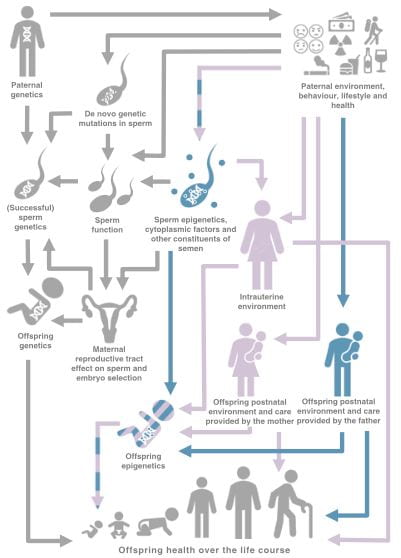 Dr Gemma Sharp, Senior Lecturer in Molecular Epidemiology
Dr Gemma Sharp, Senior Lecturer in Molecular Epidemiology
A novel thing about the Exploring Prenatal influences On Childhood Health (EPoCH) study is that we’re not just focusing on maternal influences on offspring health, we’re looking at paternal influences as well.
One of the reasons that most other studies have focused on maternal factors is that it’s perhaps easier to see how mothers might have an effect on their child’s health. After all, the fetus develops inside the mother’s body for nine months and often continues to be supported by her breastmilk throughout infancy. However, in a new paper from me and Debbie Lawlor published in the journal Diabetologia, we explain that there are lots of ways that fathers might affect their child’s health as well, and appreciating this could have really important implications. The paper focuses on obesity and type two diabetes, but the points we make are relevant to other health traits and diseases as well.

How could fathers influence the health of their children?
These are the main mechanisms we discuss in the paper:
- Through paternal DNA. A father contributes around half of their child’s DNA, so it’s easy to see how a father’s genetic risk of disease can be transmitted across generations. Furthermore, a father’s environment and behaviour (e.g. smoking) could damage sperm and cause genetic mutations in sperm DNA, which could be passed on to his child.
- Through “epigenetic” effects in sperm. The term “epigenetics” refers to molecular changes that affect how the body interprets DNA, without any changes occurring to the DNA sequence itself. Some evidence suggests that a father’s environment and lifestyle can cause epigenetic changes in his sperm, that could then be passed on to his child. These epigenetic changes might influence the child’s health and risk of disease.
- Through a paternal influence on the child after birth. There are lots of ways a father can influence their child’s environment, which can in turn affect the child’s health. This includes things like how often the father looks after the child, his parenting style, his activity levels, what he feeds the child, etc.
- Through a father’s influence on the child’s mother. During pregnancy, a father can influence a mother’s environment and physiology through things like causing her stress or giving her emotional support. This might have an effect on the fetus developing in her womb. After the birth of the child, a father might influence the type and level of child care a mother is able to provide, which could have a knock-on effect on child health.

What does this mean for public health, clinical practice and society?
Appreciating the role of fathers means that fathers could be given advice and support to help improve offspring health, and their own. Currently hardly any advice is offered to fathers-to-be, so this would be an important step forward. Understanding the role of fathers would also help challenge assumptions that mothers are the most important causal factor shaping their children’s health. This could help lessen the blame sometimes placed on mothers for the ill health of the next generation.
What’s the current evidence like?
In the paper, we reviewed all the current literature we could find on paternal effects on offspring risk of obesity and type 2 diabetes. We found that, although there have been about 116 studies, this is far less than the number of studies looking at maternal effects. Also, a lot of these studies just show correlations between paternal factors and offspring health (and correlation does not equal causation!).
What is needed now is a concerted effort to find out how much paternal factors actually causally affect offspring health. This is exactly what EPoCH is trying to do, so watch this space!

